


"Li Datong", "Wuweihe" and "Jinsanyi" ...... For many Wenzhou people, they can tell the stories about every Wenzhou "Time-honored" Brands. These brands inherit the memories of this ancient city. Although time has changed, they have been sparkled there. Today, let's move our glow sticks for them!
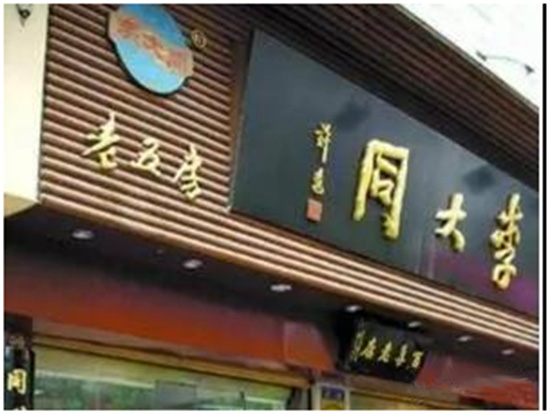
Li Datong
Li Datong tea & food store in Ruian was established in the fourteenth year of Emperor Guangxu (A.D.1889) of the Qing Dynasty (A.D.1636-A.D.1912). The founder was Li Ruiqing, a famous pastry maker in the south Zhejiang. The store got its name "Li Datong" because Li admired the spirit of "Universal Brotherhood" initiated by Sun Yat-sen. After the hard operation by Li Ruiqing and his son, Li Jinhuai,"Li Datong" had become the most well-known brand in the south Zhejiang and north Fujian provinces in 1930s.
The third descendant of "Li Datong", Li Guancheng developed the spirit of "Great Harmony" and revived family business to regain the reputation of this "Time-honored Brand". In 1990, Trademark Office of the People’s Republic China approved "Li Datong" tea & food store used the registered trademark "Li Datong". In 1995, the trademark "Li Datong" was honored as "The first batch of the famous trademarks in Ruian". In 2000, this brand was honored as "The famous trademark in Wenzhou". In Nov., 2006, "Li Datong" tea & food store was selected to be part of "The first batch of China's Time-honored Brands" by Ministry of Commerce of the People's Republic of China.
For many years, many overseas Chinese and compatriots from Hong Kong, Macao and Taiwan, who have paid a visit to relatives and friends or had a travelling in Ruian, or Wenzhou, have bought the pastries from "Li Datong" and given away the pastries to relatives and friends.
Baihao Dairy (Trademark: Qindiao brand)
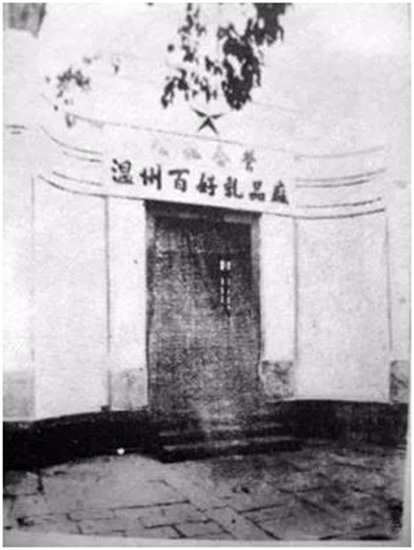
Baihao dairy plant, set up in 1926, was the first dairy plant in China. The initiator, Wu Baiheng was the father of China's dairy industry.
In 1929, "Qindiao" brand condensed milk won the first prize in the Zhonghua Chinese Goods Exhibition hosted by Ministry of Administration. Next year, it also won the special award in the West Lake Expo. "Qindiao" brand condensed milk, thus, got great fame. Its market extended to the whole of Zhejiang province from Wenzhou, and then entered into the markets of Jiangsu and Fujian provinces. After that, the production of "Qindiao" brand condensed milk had been continuously expanded, and it has become a modern-scaled dairy company, but experienced a shutdown when Japanese invaders seized Wenzhou. After the liberation of China in 1949, Baihao dairy plant was reopened in 1950. Since 1958, Baihai dairy plant, entrusted by Zhejiang Cereals, Oils & Foodstuffs Import & Export Co., Ltd., had produced "Panda" brand sweet condensed milk for export. Owing to its advanced process technology and strict quality control, after decades of effort, "Panda" brand sweet condensed milk was popular around the nation. Meanwhile, it was sold to dozens of Southeast Asian countries and regions, the export volume of which took up over 50% of the total export volume of sweet condensed milk in China. Also, it won several prizes at home and abroad. In Jan., 1996, Baihao dairy plant stopped producing "Panda" brand sweet condensed milk, because Zhejiang Cereals, Oils & Foodstuffs Import & Export Co., Ltd. took away the "Panda" brand.
In 1996, Baihao dairy plant was transformed into "Ruian Baihao Dairy Co., Ltd."
Wenzhou Yibai
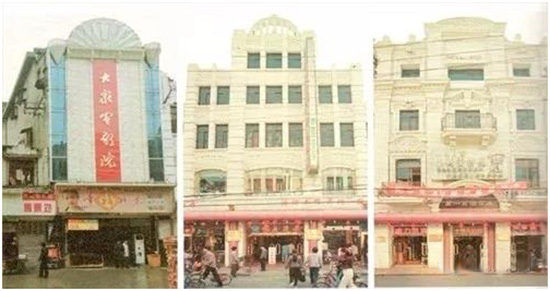
Established in 1925 and famous in the South Zhejiang, Yunbo department store was the predecessor of "Wenzhou Yibai".
Yunbo department store was founded by Xu Shuyu (1880-1967), an outstanding businessman in Wenzhou. Xu Shuyu, whose name was Yunzhang, style name Shuyu, of Ruian origin, went to Wenzhou Yida draper's to be an apprentice in the eighteenth year (A.D.1892) of Emperor Guangxu of the Qing Dynasty (A.D.1636-A.D.1912). After six years, he rented a house by himself, to open the "Xu Yunzhang Silk and Satin Shop" in Caoxian Alley. In the sixth year of Republic of China (A.D.1917), Xu Shuyu bought the house properties in Wuma Street and built the western-style building to where he moved his "Xu Yunzhang Silk and Satin Shop". Moreover, he set up the "Yunzhang Foreign Goods Store" and "Yunzhang Silk and Satin Bureau" successively. Xu earned much money as he worked so hard with painstaking effort. In the fourteenth year of Republic of China (A.D.1925), Xu built another western-style building in the west of the former one and set up the "Boou Guangdong Goods Shop" which specialized in the general merchandises. The combination of "Yunzhang" and "Boou" was called "Yunbo Department Store".
Then, Xu Shuyu bought and rebuilt more than 30 old houses behind "Yunzhang store" and "Boou store". Meanwhile, he changed the former brick-wood houses into the reinforced-concrete buildings as well as integrated several buildings as a whole to form a big architectural complex. Furthermore, Xu rented the back building to a Mr. Chen, an overseas Chinese, for use as an Italian restaurant and built a theatre behind the stores, namely "Central Grand Theatre". The combination of all the buildings was called "Yunbo Shopping Mall", the predecessor of "Wenzhou Yibai". It was a huge shopping mall with a characteristic of the comprehensive operation and was an embryonic form of the modern shopping mall which was the best in the commercial area of Wenzhou and Taizhou at that time.
Wuweihe
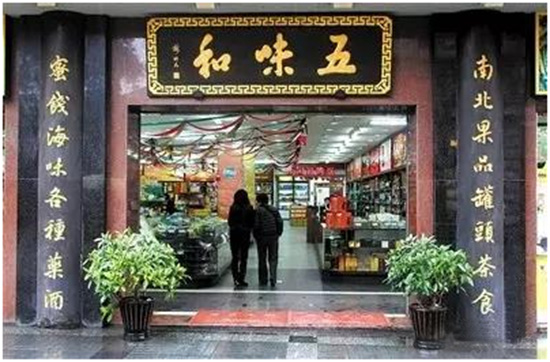
"Wuweihe" was established in the eighth year of Emperor Guangxu (A.D.1882) of the Qing Dynasty (A.D.1636-A.D.1912). At that time, Yang Zhengyu, a businessman from Cixi, Ningbo who came to Wenzhou for business, co-established the “Wuhe” glazed fruit store with his fellow-villager, Feng Bozhen. Mr. Feng was a friend of Mei Tiaoding, a celebrity in the late Qing Dynasty (A.D.1840-A.D.1912). So Feng asked Mei to write a recruitment notice for him. Mr. Mei pondered again and again, and added a "Wei" between "Wu" and "He", which meant the combination of sweet, sour, bitter, spicy and salty. It not only had a phonological harmony, but included the feature of the operation of the products. Its former address was in the west of Mantou Alley (present Gulou Street) in downtown with three storefronts.The store with a couplet "Glazed fruit, sea food and various medicated wines; Fruit, cans and sea & food from the north and south areas" at the both sides,and a shop sign named "Wuweihe" on the lintel of the door. (Moreover, a blue stone engraved with the three original characters "Wuweihe" by Mr. Mei was embedded into the nave of store, which displayed a boldness of vision). Also, in the 32nd year of Emperor Guangxu (A.D.1906) of the Qing Dynasty (A.D.1636-A.D.1912), Yang Zhiqin, son of Yang Zhengyu, succeeded his fathers' business and set up a new "Wuweihe" glazed fruit store in Wuma Street.
Since the establishment of "Wuweihe", it has paid great attention to the business characteristics. Moreover, it recruited famous experts to make glazed fruit, pickled goods, rock candies, cradles, besides purchasing well-known goods from North and South as Shanghai, Ningbo and Fujian. Meanwhile, it built a workshop behind the stores, to produce pastries, roasted seeds and nuts, medicated wines and so on. The produced glazed fruit is bright in color, rich in stuffing, moderately crispy in taste. The making of such difficult-to-produce products as the green plum and haw jelly uses superior technology and has resulted in a great reputation. The pickled goods including sashimi, shrimp paste, wine preserved crabs, Neptunea cumingi, pickled fish, sausages, preserved gizzards, ducks in soy sauce and the like are perfect in color, flavor and taste, which other counterparts cannot compare with. The most famous one is the delicious sashimi with five features, bright color, even strips, no paste, delicious taste and high storability. While, besides sashimi is sold in the Wenzhou local market, well-packed with Longquan celadon jar, it was exported to Hong Kong. A celebrity of Wenzhou origin, who lived in Taiwan, received a "Wuweihe" sashimi from his fellow villager. A pot of local speciality arose his craving for home.
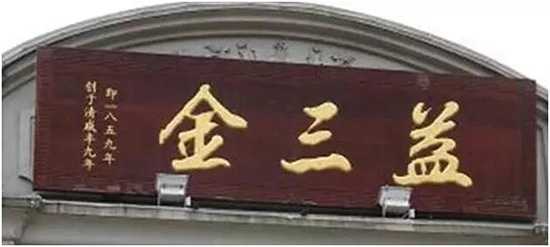
"Jinsanyi" silk and satin shop is in the No.25, Wuma Street, Lucheng District, Wenzhou. It was set up in the ninth year of Emperor Xinfeng (A.D.1859) of the Qing Dynasty (A.D.1636-A.D.1912). It is a China Time-honored Brand with more than 150 years of history.
In the beginning of the reign of Xianfeng of the Qing Dynasty (A.D.1636-A.D.1912), Jin Xubao and his two brothers from Wuxing County, Huzhou City, Zhejiang, came to Wenzhou for living with their families. After that, they took their business up again to buy up Huzhou silk and send Wenzhou Ou silk out. Owing to its exquisite workmanship and good quality, Ou silk was so popular in the out-of-town markets; Most of Wenzhou workshops liked to use Huzhou silk, thus, these three brothers got a win-win with earning a large amount of money.
In the ninth year of Emperor Xianfeng of the Qing Dynasty, three brothers collected 6,000 silver dollars (then used coins) to open a silk and satin store specializing in Huzhou silk, Suzhou silk and Hangzhou silk under the Drum Tower in downtown area. The original name of this store was "Jintongyi", which was changed as "Jinsanyi" later, meaning three brothers all could get benefits. After several years, they moved the store to the middle area of Wuma Street, expanded its new store and began to sell wool fabric and cottons. Through the effort of generations (the fourth descendant, Jin Jimin was nominated as vice manager of "Jinsanyi" silk and satin store in Sept.,1948), they have become the giant in the silk and satin field of Wenzhou. It was honored as the most reliable store.There was a jingle in Wenzhou at that time: "Wear a "Dongguifang" on the head (the famous hat store), a "Yushunkang" on the feet (the famous shoes store) and a "Jinsanyi" silk and satin store on the body".
Lao Xiangshan
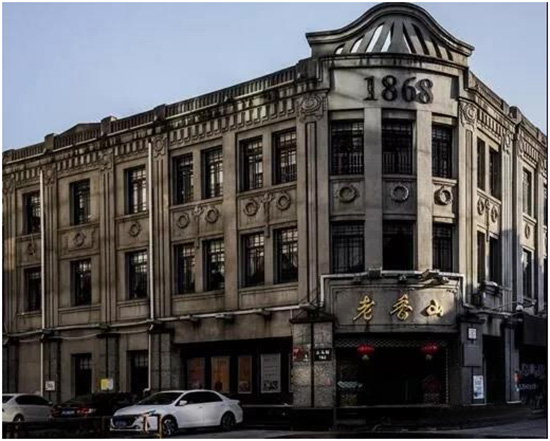
The "Lao Xiangshan" pharmacy was established during the reign of Emperor Tongzhi period(AD 1868) of the Qing Dynasty (AD1636-AD 1912). It has a history of more than 140 years. The founder of the company was a man whose surname was Li (his name, date of birth and death were unknown) , a Xiangshan druggist from Ninghai County, Mingzhou. He set up important points in the west end of Wuma Street, Sigu Bridge (currently known as Datong Lane) and named them with his hometown "Xiangshan". Afterwards, Datong Lane gradually became the "pharmacy street". "Xiangshan" provided tea and practised medicines by taking the pulses. With its warm and thoughtful services, it became famous once.
As time went by, during the reign of Emperor Guangxu period (AD1871-AD1908), a family branch of the House Li from Ninghai opened a Xiangshan branch at the entrance of Qifeng Lane of North Street (present Jiefang Road), which was commonly known as New Xiangshan. Therefore, Xiangshan was called as "Lao Xiangshan".
Pan Ruiyuan
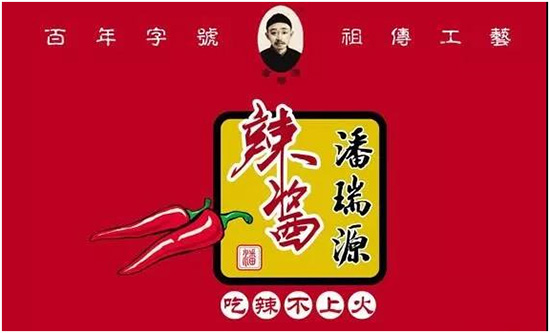
“潘瑞源”牌辣椒酱,始创于清朝宣统三年(公元1911年)距今已有一百多年的历史,创始人潘瑞源,那时候浙闽地区民多赢弱,瘟疫成殃,潘瑞源研制健身预防之方以济世,用本地产之椒蒜,配成蒜味辣酱,分送邻居服用,惊收奇效,瘟疫日减,乡里竞相传颂其德,一时誉满江南。后求酱者日增,经反复研制,配方日臻完美,遂开设作坊,生产辣椒酱,并设店于瑞城东门,以健身调味品投售于市,生意红火,乡里称美,相传至今,已有百年历史,口碑极佳。
"Pan Ruiyuan" brand chili sauces were founded in the third year (AD1911) of Emperor Xuantong of the Qing Dynasty (AD1636-AD 1912) and has a history of more than one hundred years. The founder was Pan Ruiyuan. Most of the people in Zhejiang and Fujian Provinces at that time were weaker and the plagues reaped a terrible toll of people's lives. Pan Ruiyuan developed a therapy to prevent people away from the plague. He mixed the homegrown peppers and garlics to produce garlic- flavor chili sauces. He sent them to neighbors to take, and then got a shocked and surprising effect. Since then the plagues got controlled. His virtues were widely praised by the villagers, and he made his name in the regions south of Yangtze River. Owing to the increasing demands of saucer buyers, the formula has become more and more perfect after repeated development. The workshop was built to produce chilli sauces and the store was set up at the east gate of Ruicheng City. The sauces were sold as condiments. The business was booming and the products were well praised among the villages. So far, it has a hundred years of history and enjoys an excellent reputation.
Yetongren Tang
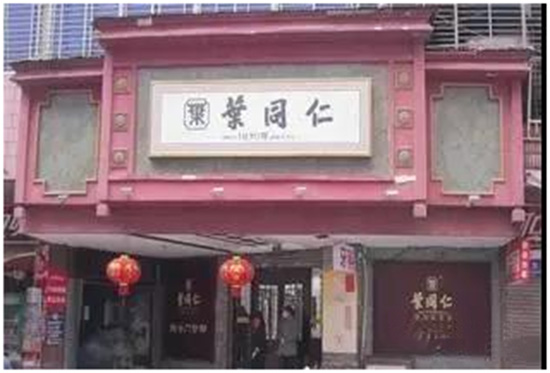
Wenzhou Yetongren Tang drug store was established in the ninth year (AD 1670) of Emperor Kangxi of the Qing Dynasty (AD1636-AD 1912). It is quite famous in the north of Fujian Province and the south of Zhejiang Province. It was once selected as one of China's 100-year-old pharmacies. In 1956, the drug store was changed to Wenzhou Sinopharm Joint Pharmaceutical Factory through the public-private partnership, which made the name "Yetongren Tang" no longer used. In 1965, it was renamed as Wenzhou Pharmaceutical Factory. In 2002, Wenzhou Haihe Pharmaceutical Co., Ltd. registered the "Yetongren" trademark with the Trademark Office of the State Administration for Industry and Commerce of the People's Republic of China. However, due to the consideration that the word "Tang" was an alternative name for the store, so the company name "Yetongren" was followed by the word "Tang".
“Xianqian” Glue Pudding Shop
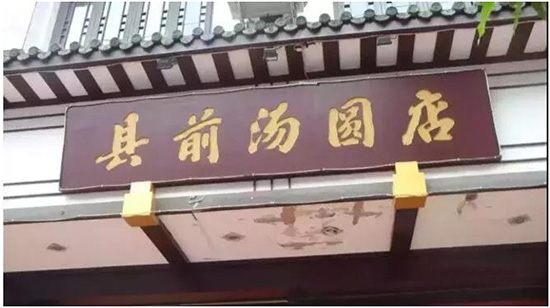
The "Xianqian" glue pudding shop was formerly called as "Zheng Deda" glue pudding shop, which was the first glue pudding shop in Wenzhou and opened during the reign of Emperor Xianfeng period(AD1831-AD1861) of the Qing Dynasty (AD1636-AD 1912) . There were two glue pudding shops "Huang Xinfa" and "Zhiweiyuan" set up in the county during the period from 1928 to 1938. These three glue pudding shops had their own characteristics. Among them, the taste of fresh-meat glue pudding in "Zhiweiyuan" store was the best with the jelly stuffing. This type of stuffing was so easy to melt in the boiling soup. When you bit off the glue pudding, your mouth is full of the delicious soups. The bean-paste glue pudding and the black-sesame glue pudding of “Huang Xinfa” shop were delicious and flavored with the high-quality "Fruit brand" banana essence. The materials used for the black-sesame glue pudding of "Zheng Deda" shop were the most exquisite. In 1958, these three shops were combined as one and renamed as “Xianqian” glue pudding shop.
Tongchun Brewage
The "Tongchun", originated in 1919, is nearly 100 years old. Its predecessor, "Tongchun Sauce Garden", was located in Jinxiang, an ancient town in the south Zhejiang and a land flowing with milk and honey. The "Tongchun" is the "father" of the brewing industry of the south Zhejiang. This company is currently a brewing company with a larger scale, more complete varieties and higher market share in Wenzhou.
Qiangneng Fish Balls
Wenzhou Qiangneng Food Co., Ltd. was formerly known as Wenzhou's well-known fish ball old shop -- Qiangneng fish balls. The craftsmanship of Qiangneng fish balls and fish cakes were founded in 1955. And it started in 1978 to get a brand image. The company, which was established in 2009, is a comprehensive company that specializes in Wenzhou special snacks and integrates food production, processing, distribution, and catering chains as a whole.
Fast Deer Group
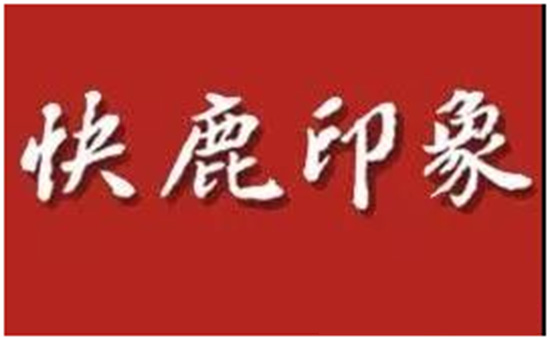
Wenzhou Fast Deer Group Co., Ltd. is a key enterprise of "a batch of five" project (A national project to aide the poor) and a leading agricultural enterprise in Zhejiang province. Founded in 1958, it mainly produces “fast deer” brand monosodium glutamate and instant frozen food.
“Miliqiong” Wine
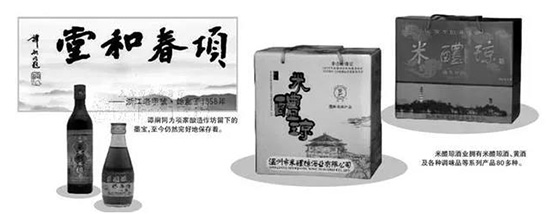
There has been a long tradition of brewing wine in the area of Songao Village, Guoxi Town, Ouhai District. The best known wine is the "Miliqiong" wine, among which the most famous is the "Miliqiong" of the House Xiang. Xiang Gongning, the ancestor of House Xiang, had a relationship with Tan Sitong, a famous reformist in late Qing Dynasty (AD1840-AD1912). Tan Sitong once left his calligraphy for the brewing workshop of House Xiang, writing down four characters "Xiang Chun He Tang" on a plaque. The predecessor of Wenzhou Miliqiong Wine Co., Ltd. was the "Xiangchunhe" sauce garden founded in 1858 . After the corporatized production, "Miliqiong" wine of House Xiang sold well in Wenzhou. And one kind of 175 ml "Miliqiong" packed in a wine cup was called by consumers as "Sanliangsan" and is particularly popular.
Huadali
Originally called "Yidali (Italy)", Huadaili was an old brand store. It was invested by a Qingtian overseas Chinese whose surname was Chen, and was forced to suspend business on the eve of liberation of China in 1949. The catering company transferred the Chinese and Western chefs and resumed its business in 1956. It was regarded as the prototype of the Wenzhou hotels with its supply of high-priced dishes. The second floor served the Chinese food, the third floor served the western food and snacks, and employed famous Chef Xu Yanchi to cook. It was called as the first restaurant in the south Zhejiang at that time. After the outbreak of World War II, Mr. Chen and his wife left Wenzhou to go abroad and transferred the hotel to Xu Yanchi and other two people. Then it was renamed as "Huadali".
They renovated the restaurant greatly and decorated it luxuriously. Huadali specialized in the food business. Due to its well management and distinctive features, it gained a great fame for a time. The official and the wealthy always set up banquets at "Huadali" restaurant.
In the mid and late 1980s, it became very popular. Setting up a wedding banquet in "Huadali" was the symbol of splendor and elegance. At that time, Hudali even once had launched a wedding banquet with over 2,000 RMB per table.
Whit Snake Sesame-seed-cake
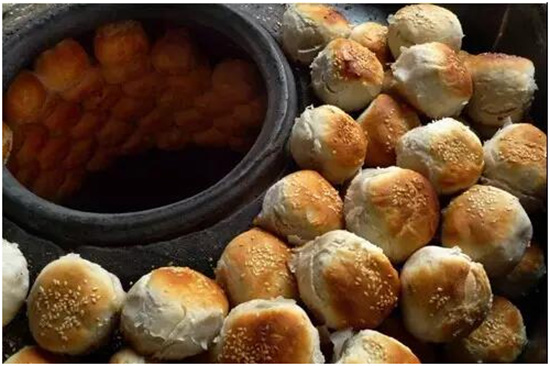
The white snake sesame-seed-cake is a traditional snack in Zhejiang province. It’s crisp, fragrant and rich with aftertaste. At the end of the Emperor Guangxu period of the Qing Dynasty (AD1636-AD 1912), there was a sesame-seed-cake shop opened by Mrs.Zhang in the right side of the Clock Tower of Futou gate in Wenzhou downtown. Its "Scallion Oil & Crispy sesame-seed-cake" was made up of 50 kg of flours and 8.5 kg of lards and kneaded into a crisp noodle. And the stuffing was made of salted pork diced meat, wine soaked shrimps, sweet pickled cucumber, vegetable silk and chopped green onion, mixed with sesame oil. The cake was baked with charcoal after forming. The baked sesame-seed-cakes were yellowy in color and crispy in taste. The owner of the shop was a widow and her sesame-seed-cakes were very popular with people. Because she liked wearing white clothes, people called her as "Bai Niangniang", likening her to the character in the ancient opera "The Legend of White Snake". Then her sesame-seed-cake also got the name as "Whit Snake sesame-seed-cake".
The article is originated from 66wz
Translated by Eric Ye & Estelle Wang


